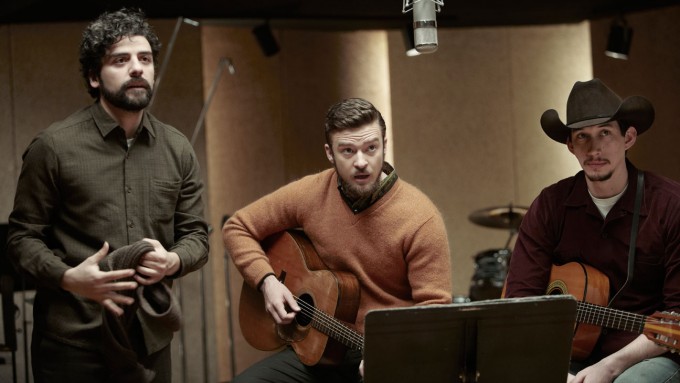
Joel and Ethan Coen’s latest film, Inside Llewyn Davis, played free on Sunday before a packed house in 4070 Vilas Hall. It screens in an encore presentation on Thursday, December 12, and if you’ve yet to see it, please do, because it’s a doozy. In a sour picture filled with pathos, Oscar Isaac’s struggling folk artist makes for a fascinating, funny, and often infuriating look into the way our own ambitions limit our potential.
It’s also got fantastic music. Huffington Post’s Mike Ryan recently compiled a short oral history on the collaborative process involved in “Please, Mr. Kennedy,” the soundtrack’s deliciously cheesy entry. Featuring performances from actors (Isaac, Carey Mulligan), established musicians (Marcus Mumford, Punch Brothers), and a bit of both (Justin Timberlake), the film sports a stellar collection of folk music.
Just how stellar is it? As Scott Renshaw observed in a recent tweet, each song represents a distinct piece of Llewyn’s character. The Coens begin with Llewyn’s cover of “Hang Me, Oh Hang Me,” sung atop a barstool inside the smoky, pale glow of the Gaslight Café. As a solo act, Llewyn looks defeated in this moment, and Oscar Isaac delays the delivery of his lyrics to match that despondence. He truly looks at though he’s “been all around this world.” While he’s morose and tired, the song reveals also Llewyn’s refusal to be complacent. You can hang him all you want; it’s the “laying in the grave” that’s the worry.
Later, Llewyn sits in on a folk show, smoking and scoffing at the cheery melodies of a fellow musician and easygoing cadet (Stark Sands), who’s shipping out overseas bright and early the next day after one last show. When the cadet announces he’d like to conclude his set with the help of a few friends, Llewyn instantly assumes it’s an invitation. In a wry, funny moment, Llewyn’s friends Jim (Timberlake) and Jean Berkey (Mulligan) are revealed to be the guests, and his wounded ego never lets him relish in the improvised trio’s bouncy harmonies, their cover of “Five Hundred Miles” gently skewering Llewyn’s loneliness in ironic fashion. Despite their singing to the contrary, it’s clear Jim, Jean, and even that annoying cadet have found their places, and it’s really Llewyn who should be up there singing about how wayward he’s become on his journey.
Inside Llewyn Davis isn’t all cynical defeatism, though. While holed up on the couch of an old professor, Llewyn warms over his lonely morning with nostalgia, playing a shelved pressing from his days as a duo with his now dead songwriting partner. Ostensibly their biggest hit, the cover of “Dink’s Song” functions as a goodbye to a lover as well as an au revoir to an old friend, his memory now just a voice on vinyl.
Things take a turn for the comedic in the aforementioned “Please, Mr. Kennedy.” Delivering 60s anxieties to the President’s doorstep, the number is a light, absurd composition, but there are multiple engines churning below its surface level pop. With Jim on lead vocals, Llewyn’s status as a last minute studio fill-in places him out of the spotlight he so desires. Left to rhythm guitar and backup vocals, he’s stuck finding his way through Jim’s lead and the strange bops and lip sputters of Al Cody (a small but memorable role from Adam Driver). Counting his stutters in singing “p-p-p-please,” Llewyn’s not a fan of the number, and its layered confusion and lack of artistry are enough to blind him to more immediate concerns like locking down royalty rights in favor of a quick buck.
It may not be the soundtrack’s strongest selection — that honor goes to Isaac’s rendition of the English ballad “The Death of Queen Jane” — but “Please, Mr. Kennedy” feels genuine, organic and a little rough around the edges. Really, so does every other selection Marcus Mumford and music supervisor (and Coens mainstay) T-Bone Burnett include, and it’s to their credit that Inside Llewyn Davis ties each of its musical set pieces to its character. There’s richness and sacrifice within Llewyn’s barren appeal to F. Murray Abraham’s Chicago club owner, and a performance of “The Shoals of Herring” for Llewyn’s bed-ridden father feels both reverent for and wistful over an uncertain future. So when the Coens tip their hand and reveal that they’ve begun their film in medias res, revisiting Llewyn’s Gaslight performance of “Hang Me, Oh Hang Me” adds weight and hardship to the number. The music of Inside Llewyn Davis feels borrowed and embellished, even within the same song. To quote the film’s figurehead, “It’s not new, and it never gets old.”
- An encore presentation of Inside Llewyn Davis plays this Thursday, 12/12 at 7:00p in 4070 Vilas Hall. Doors open at 6:15p.
